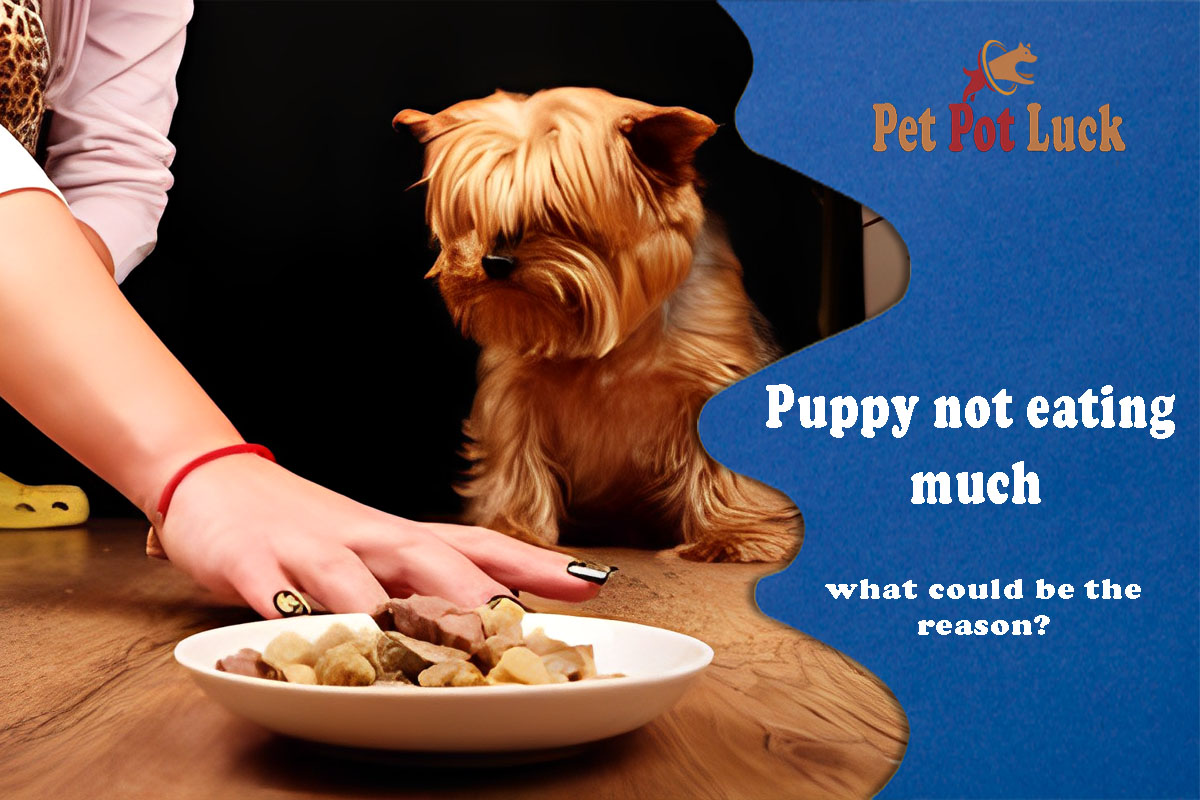You’re enjoying time with your new puppy, but suddenly, they turn away from their food! You might think of the puppy not eating much- what could be the reason?
Nothing can be more scary when you’re a puppy lover and you see your puppy not eating much! It’s quite common sometimes but if this is happening for a long time, it’s a matter of concern. Your puppy may refuse to eat for several reasons such as if they feel stressed, introducing a new place and food, sudden changes in diet, food-related problems, and other medical conditions.
In this guide, we will discuss the possible reasons behind your puppy not eating much and how to fix it. Hope this guide will help your puppy get back its appetite and enable you to have puppy fun again!
Puppy not eating much – what could be the reason?
Six common reasons behind your puppy not eating much
The puppy not eating much- what could be the reason? Figuring out why your puppy won’t eat is super important for keeping them healthy. Let’s check out the common reasons:
Changes in the environment causing stress
One of the major causes of a puppy not eating is sudden changes in the environment that may lead to stress. For example: moving to a new place, meeting new people, and even introducing a different daily routine can make your puppy feel uncomfortable and eat less.
In addition, loud noises, temperature changes, and meeting new animals can also stress your puppy. When your puppy is dealing with those changes, be patient and let them adapt to them.
Some of the major signs of your puppy not eating because of stress include tongue flicking, a tight face, a low tail, or ears pulled back. Those signs are normal and vanish over time as the puppy gets used to the environment. However, if these signs are consistent for a long time, make sure to consult your vet.
Sickness or health issues
If you observe your puppy not eating as it used to, it means there’s something wrong with your pet’s health. Your favorite puppy may face a loss of appetite due to several medical conditions.
● Digestive problems: Your puppy may suffer from digestive issues because of stomach aches or gastroenteritis.
● Stomach or tummy problems: Tummy problems are one of the most common reasons for your puppy not eating. It can arise from various sources such as viral infections, bacterial infections, or inflammation in the gut. Sometimes, pets might feel unwell because they’ve eaten something wrong. Even sudden shifts in their diet, like introducing new foods too quickly, can upset their tummies. So, make sure to be aware of those things.
● Teething or oral problems: When puppies start teething (around 3 to 6 months old), their gums can get sore and make eating uncomfortable. This might cause the puppy not eating much. Sometimes, other mouth problems like dental issues or infections can also make it painful for them to eat, so they might not feel like eating much.
● Pain: Puppies are masters at hiding their pain. When your puppy gets hurt or feels pain, this might cause the puppy not eating their food much. Therefore, you should take care of your pet so that it doesn’t get hurt.
● Organ problems: If a dog has problems with important organs like the heart, lungs, liver, pancreas, or kidneys, they might feel sick and lose their appetite. This is another big reason for your puppy not eating much.
● General illness: Puppies can become sick due to viral infections and this might cause loss of appetite and render your puppy not eating much.
Behavioral changes
Puppies often behave like little kids and get curious or anxious, and this can change how they eat. Sometimes, they might say “no” to food to show they’re in control or to see what happens. If their mealtime isn’t consistent, it can make them act this way about food.
Puppies can also feel anxious, especially when left alone. This worry can make your puppy not eating much food. Also, giving too many treats or human food can mess up their eating routine, so they might not feel hungry at mealtime.
We’d recommend offering them a balanced diet at regular times and avoiding too many treats. This can help teach them healthy eating habits and also ease their worries.
Problems related to food
Sometimes, puppies are picky eaters. Food-related problems are another common reason that may lead to your puppy not eating much. They might not like the taste, feel, or smell of their food, and thus refuse to eat.
Also, if the food isn’t fresh or if it’s old or stored wrong, they won’t feel like eating the food. Besides, sudden changes in diet like introducing a new type of food or starting a different brand, can cause your puppy not eating food. In that case, you can make changes to their food slowly.
Also, be aware of the food allergies of your favorite puppy as this can become harmful. Often food allergies prevent your puppy not eating food.
Tiredness from physical activity
Puppies have a lot of energy and need to move around a lot. But if they play too much and get really tired, this might render your puppy not eating all its food. On the other hand, if they don’t play enough, it might also affect their appetite.
So, you need to make sure that they have the right balance of playing and resting so that they want to eat their food.
Side effects from vaccines or medication
Sometimes, after getting vaccines or taking medicine, puppies might not want to eat for a bit. It’s usually okay and nothing to worry too much about. But if they keep not eating for a long time after medicine or shots, it’s a good idea to check with the vet just to be sure everything’s okay.
Read More:
Can adding water to Dry Dog food cause Diarrhea? Complete Guide
Can You Freeze Fresh Pet Dog Food? Idea To Store
What Foods Cause Tear Stains In Dogs? Food to Avoid
What is Chicken Meal in Dog Food? Is it safe for your pet?
How to solve the issue of your puppy not eating much?
Now that you know the puppy is not eating much- what could be the reason? Let’s solve the issue of your puppy not eating much:
Puppy not eating dry food?
Try mixing in a bit of wet food or broth—it adds a smell and makes it easier to chew. Also, warming it up can make it more tempting.
Puppy not eating wet food?
Mix in some dry kibble for a different texture they might like. Just make sure it’s good quality for their nutrition.
Teething puppy
Puppies might not eat when teething. During this phase, give them soft toys to chew on or frozen food cubes for relief. Soft, soaked food or easy-to-eat meals can help too.
Relieving stress
Relieving the stress of puppies can get them back to eating. Try to keep the environment as calm as possible. Make sure your puppy eats in a calm, cozy place away from lots of people walking around. Being nice and giving them good vibes can help them get used to the changes better. Play, exercise, and good sleep can calm them down and make them want to eat.
Puppy training
Training your puppy can help them learn good eating habits. At meals, be positive and teach your puppy that food means good stuff. Reward their good behavior with love and playtime. But never make them eat or punish them- it could make them dislike food.
Maintain a consistent eating pattern
Make sure to maintain a consistent feeding pattern for your puppies based on their breed size and age. You might follow how many calories should my dog eat to provide the required nutrition.
- Small breed puppies aged 2-4 months should have 4 meals a day. At 4-6 months, reduce to 3 meals, and after 6 months, maintain 3 meals daily.
- Medium breed puppies aged 2-4 months also need 4 meals. At 4-6 months, decrease to 3 meals, and for those over 6 months, provide 2 meals.
- Large breed puppies at 2-4 months should have 4 meals. From 4-6 months, give 3 meals, and after 6 months, offer 2 meals a day.
If your puppy is not eating well, gradually switching their food type can sometimes help, but do it slowly to prevent stomach upset.
Frequently Asked Questions (FAQs)
Why did my puppy suddenly stop eating?
If your puppy’s eating habits suddenly change, it could be due to stuff like new surroundings, feeling stressed, teething, or an upset tummy. But if your puppy goes a whole day without eating or shows other signs like extreme tiredness, throwing up, or strange poop, we recommend consulting a vet immediately.
What could be the reason for my puppy not eating while behaving normally?
If your puppy is not eating much but seems fine otherwise, they might be teething or not liking their food. Overfeeding treats can make them less hungry during meals. So, keep an eye on their eating habits, and if they don’t eat for more than a day, talk to the vet.
Is it a good idea to make a dog eat forcefully if they’re not willing to?
Don’t make your dog eat if they don’t want to. Instead, try offering tastier food or motivating them to eat. If they keep not eating and you’re worried, talk to your vet for help.
Why is my puppy’s tummy gurgling and they refuse to eat?
If your dog’s tummy is making gurgling sounds and they’re not eating, it might mean their stomach isn’t feeling good. That noise happens when gas moves in their belly. If they seem sick or haven’t eaten for a whole day, it’s best to talk to the vet for help.
Why does my dog refuse their food but still eat treats?
Your dog might skip their food because they don’t find it tasty or because they’re waiting for treats they like more. If you notice a sudden change in their eating habits, it’s important to check with the vet. And if it seems like your dog is just being choosy, learning how to handle a picky eater might help.
Conclusion
The puppy not eating much- what could be the reason? Figuring out the reason behind your puppy not eating much involves paying attention to their activities, looking for any changes, and noticing any signs of health issues.
In addition, the reasons behind their loss of appetite can range from their behavior to environmental factors. We’d recommend maintaining a consistent daily routine for meals, avoiding human treats, and keeping them in a healthy, calm environment. If you follow these tips above, you can keep your puppy happy!


